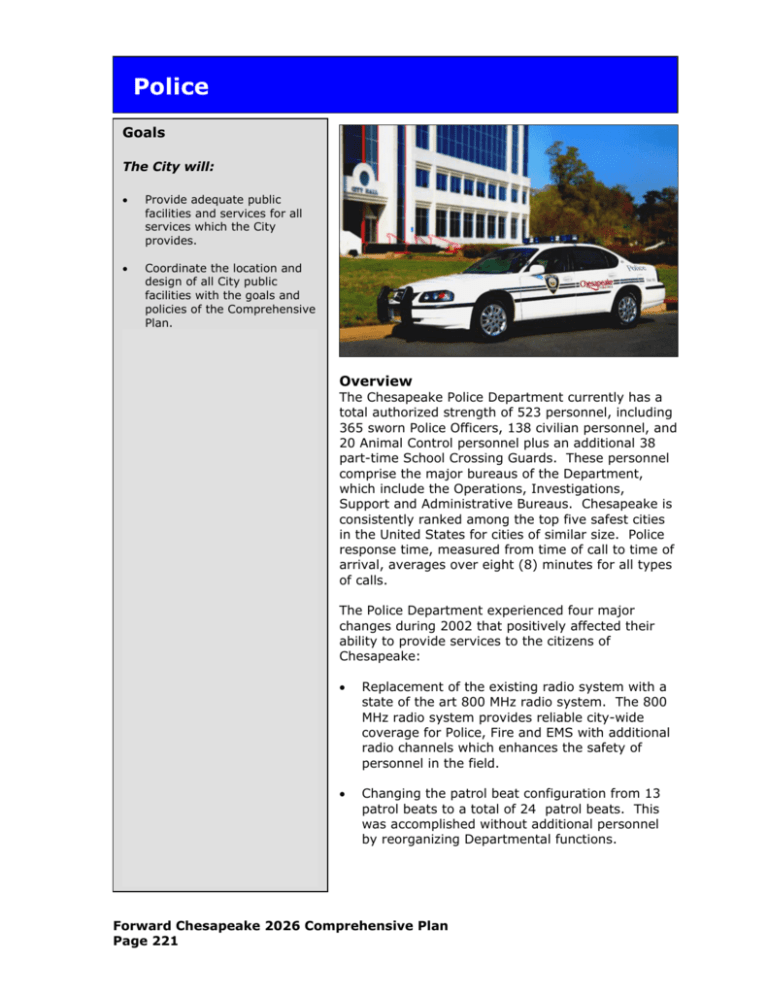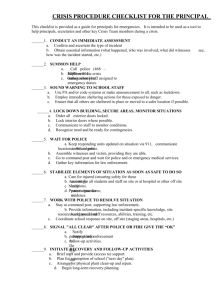Police - City of Chesapeake
advertisement

Police Goals The City will: • Provide adequate public facilities and services for all services which the City provides. • Coordinate the location and design of all City public facilities with the goals and policies of the Comprehensive Plan. Overview The Chesapeake Police Department currently has a total authorized strength of 523 personnel, including 365 sworn Police Officers, 138 civilian personnel, and 20 Animal Control personnel plus an additional 38 part-time School Crossing Guards. These personnel comprise the major bureaus of the Department, which include the Operations, Investigations, Support and Administrative Bureaus. Chesapeake is consistently ranked among the top five safest cities in the United States for cities of similar size. Police response time, measured from time of call to time of arrival, averages over eight (8) minutes for all types of calls. The Police Department experienced four major changes during 2002 that positively affected their ability to provide services to the citizens of Chesapeake: • Replacement of the existing radio system with a state of the art 800 MHz radio system. The 800 MHz radio system provides reliable city-wide coverage for Police, Fire and EMS with additional radio channels which enhances the safety of personnel in the field. • Changing the patrol beat configuration from 13 patrol beats to a total of 24 patrol beats. This was accomplished without additional personnel by reorganizing Departmental functions. Forward Chesapeake 2026 Comprehensive Plan Page 221 • Decentralization of all uniform patrol operations and placement of Captains to head precincts throughout the City to enhance community relations and to be more responsive to the needs of the community. • Equipping all uniformed patrol personnel with laptop computers to increase their effectiveness and efficiency. Officers in the field are capable of preparing reports of incidents and obtaining National, State and local information via wireless connection. Police Department facilities are strategically located throughout the City and consist of five (5) precincts. All uniform patrol operations are handled at the precinct level. The precincts are each commanded by a Captain, except the Third Precinct. Police Headquarters is located in the Police-Fire Building in the Civic Center Complex. From this facility the major bureaus operate with their support staff to provide police services throughout the City. Support functions within the facility include: Records; Identification; Crime Prevention; Information Technology; Internal Affairs; Criminal Investigations; Special Investigations; Federal Task Force Operations; Warrants; Planning; Crime Prevention Through Environmental Design; Crime Analysis; State Standards and Accreditation; Intelligence; Traffic, Abandoned Vehicles, Overweight Vehicles, Motorcycle Escort, Radar Enforcement; Property and Evidence; Accounting, Budget and Payroll; Public Information; Inspections; and the 911 Emergency Center for Police-Fire-EMS emergency response. The First Precinct is co-located with Police Headquarters in the Public Safety Building. A Police Captain is assigned to this facility which is staffed by a civilian Information Specialist on a 24-hour a day basis to handle civilian walk-in traffic and requests. The Canine Unit (K-9) is assigned to this precinct providing city-wide coverage and has a total of 7 police dogs. The dogs are specially trained for patrol operations including searching for narcotics and people. One dog is specially trained for explosive detection. The First Precinct is responsible for routine and emergency police patrol operations and covers the area consisting of Great Bridge and Hickory to the North Carolina Line. There are four patrol beats in this area, each staffed by one officer 24 hours a day. The Second Precinct is located in the South Norfolk area. A Police Captain is assigned to this facility, which is staffed by a civilian Information Specialist during the week during normal working hours to handle civilian walk-in traffic and requests. The Second Precinct covers the area consisting of South Norfolk and Indian River. There are six patrol beats in this area, each staffed by one officer 24 hours a day. The Third Precinct is located in the Deep Creek area and is unmanned for civilian walk-in traffic. The Police Captain assigned to the Fourth Precinct is responsible for overseeing the operations of this Precinct. The Third Precinct covers the area consisting of Brentwood, Camelot and Deep Creek to the North Carolina Line. There are five patrol beats in this area, each staffed by one officer 24 hours a day. The Fourth Precinct is located in the Pughsville area. A Police Captain is assigned to this facility and is also staffed by a civilian Information Specialist to handle civilian walk in traffic and requests. The Fourth Precinct covers the area consisting of Western Branch, Pughsville and Bowers Hill. There are four patrol beats in this area, each staffed by one officer 24 hours a day. The Fifth Precinct is located in the Princeton Halls area of Greenbrier. A Police Captain is assigned to this facility, which is also staffed by a civilian Information Specialist. The Fifth Precinct covers the area south of Military Highway to the Intracoastal Waterway Forward Chesapeake 2026 Comprehensive Plan Page 222 Canal and from the Elizabeth River to Virginia Beach (Greenbrier and Crestwood). The Fifth Precinct operates out of a leased office building. There are five patrol beats in this area, each staffed by one officer 24 hours a day. Reported Crimes Crime Homicide Rape Robbery Felony Assault Burglary Larceny Auto Theft TOTAL 2002 6 65 321 971 1,438 5,351 604 8,756 Forward Chesapeake 2026 Comprehensive Plan Page 223 2003 5 70 483 926 1,258 5,753 615 9,110 2004 12 61 293 735 1,313 5,975 634 9,023 The Police Academy is located on Number Ten Lane in the Southern portion of Deep Creek on property that once housed the U.S. Army Nike Missile Site. Basic, In-Service and Specialty training for police officers is provided on an on-going basis and the training is also available for other area law enforcement personnel. The site contains a small physical workout area, four classrooms, administrative offices, and the recently opened pistol range, a state of the art 28 position range. Arrangements have been made with the U.S. Navy to utilize an unused runway at the Navy Fentress Landing Field for driver’s training. The Police Department’s Community Resource Vehicle program, which allows officers to take police vehicles home and operate them for personal use within the City, has approximately 142 units. This program has been a valuable resource for the Department, by adding to the Departments exposure. The resulting additional number of police units on the street at varying times has proven again and again to be a beneficial program. Current local financial constraints threaten the ability of the Department to maintain this program. The Police Department operates a Civilian Police Academy for citizens interested in law enforcement and the department. Currently there are over 350 graduates of this program in the 16 Sessions that have been conducted throughout the city. This has been a very positive program with strong citizen support. The Police Department has officers assigned to each of the City’s Middle and High Schools. This program has been in effect since 1973 and provides students with strong positive law enforcement models in addition to providing a strong law enforcement presence within the schools. This program is managed at the Precinct level and strongly supported by the School System. The Police Department makes extensive use of volunteers throughout the department in an effort to maximize its effectiveness. The Police Auxiliary Unit consists of 33 civilian personnel who are state certified law enforcement officers. These individuals assist uniform patrol operations on the street and at various events, assist in serving of court papers and perform other law enforcement functions. The Police Chaplain Unit consists of pastors who provide counseling services to both law enforcement and civilian personnel when requested or needed. The Department maintains several part-time specialty units composed of personnel from all areas of the Department. They are trained, equipped and capable of responding to incidents when activated. The Special Weapons and Tactics (SWAT) Team handles high risk search warrants, barricaded and hostage situations. The Underwater Search and Rescue Team (USART) is responsible for the recovery of evidence that may be underwater and water rescue. The Special Incident Response Team (SIRT) is responsible for handling a large civil disturbance within the City. The Boat Unit provides water patrol on the waterways in the City during the summer months. An all-weather boat is currently on order to provide year-round coverage of high-risk waterfront areas. Funds for this boat were obtained through a Federal Homeland Security Grant Forward Chesapeake 2026 Comprehensive Plan Page 224 The Animal Control Bureau is located in Animal Shelter building at the Cavalier Industrial Park and is responsible for handling all animal issues involving domesticated animals, including enforcement of animal laws, impounding of stray animals, protection of abused animals, adoption, euthanasia and operation of the Animal Shelter. The Animal Shelter was built in 1987. The Animal Control Bureau operates 16 hours a day and personnel are available for emergency calls during all other periods. Impounded or abandoned animals are held until claimed, adopted or euthanized. There are 11 Animal Wardens authorized. Issue One: Population Growth In order to maintain excellent public safety records, police facilities, services, and personnel will need to be increased with population growth. Growth has created the need to expand or replace existing facilities and programs. This need will increase a population increases. Existing needs include improvements to the 911 call center and more precincts to serve the southern portion of the City. Some facilities have exceeded their functional lifespan require renovation or replacement The National Law Enforcement average is two law enforcement personnel per 1,000 population. The City should use this figure as a guide to determining future staffing levels. The City will strive to maintain its excellent public safety record and will develop strategies to maintain this high level of service. Strategies: • The City will continually evaluate its police stations and precincts to ensure that they are aligned for maximum efficiency. • Where enhanced service is warranted, the City will develop an implementation strategy to provide new, expanded, or relocated stations. • In order to reduce costs, opportunities to co-locate police stations with other public facilities should be explored. • When considering possible funding sources for police services, opportunities for creative funding sources should be sought including possible public/private partnership options. Forward Chesapeake 2026 Comprehensive Plan Page 225









